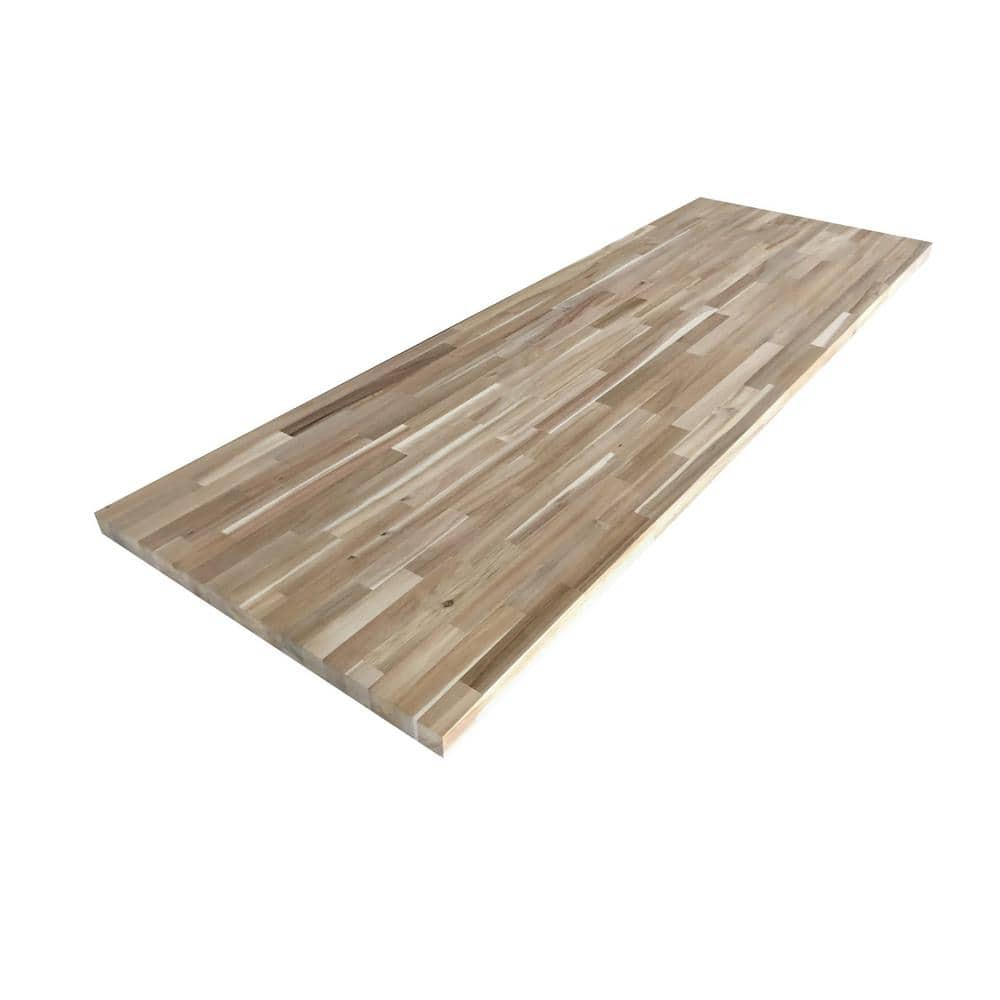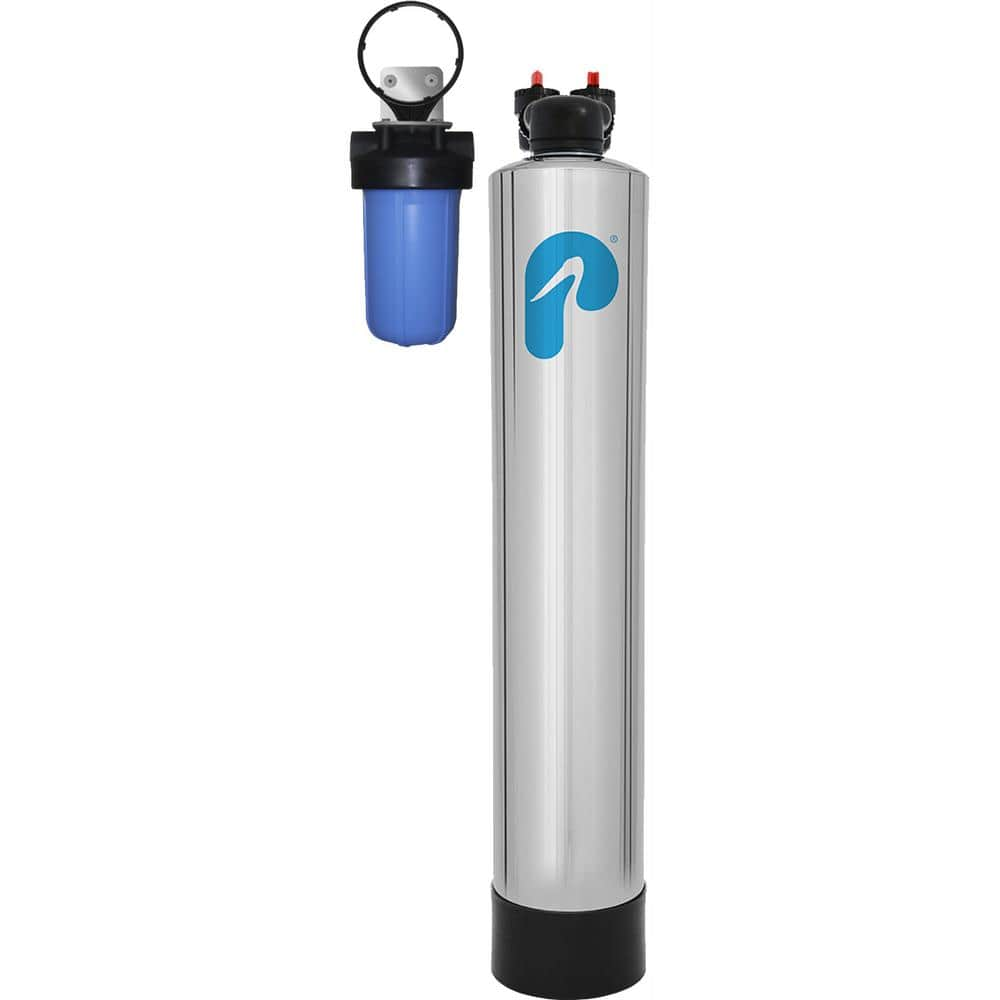Hampton Bay 6 ft. L x 25 in. D Unfinished Acacia Butcher Block Countertop in With Standard Edge
Dimensions: 74 in. L x 25 in. D x 1.5 in. T. Acacia hardwood countertop adds warmth to your space. Unfinished butcher block leaves room for customization.
Enhance the visual appeal of your modern kitchen with this Hampton Bay unfinished acacia butcher block countertop. The unfinished surface allows customization, letting you add a personal touch with your choice of stain or finish. Easy to maintain, this island countertop is naturally resistant to mold and mildew. Acacia hardwood is stable and durable, holding up well to extreme temperature changes. This Hampton Bay unfinished acacia butcher block countertop features a luxurious grain and rich shade of brown for added warmth.
- Countertop slab measures 74 in. L x 25 in. D x 1.5 in. T
- Solid acacia hardwood offers strength and beauty
- Unfinished surface accommodates your preferred stain or lacquer
- Customizable butcher block is ready for cutting and finishing
- Naturally resistant to mold and mildew
- Each butcher block is unique and product may vary slightly in color or grain
- Very durable
- Works great as a desktop, standing desktop, work bench or table
Additional information
| Approximate Product Length (ft.) | 6 ft. |
|---|---|
| Product Depth (in.) | 25 in. |
| Product Length (in.) | 74 in. |
| Product Thickness (in.) | 1.5 in. |
Twenty-Five or 25 may refer to:
- 25 (number), the natural number following 24 and preceding 26
- one of the years 25 BC, AD 25, 1925, 2025
6 (six) is the natural number following 5 and preceding 7. It is a composite number and the smallest perfect number.
Acacia, commonly known as wattles or acacias, is a genus of about 1,084 species of shrubs and trees in the subfamily Mimosoideae of the pea family Fabaceae. Initially, it comprised a group of plant species native to Africa, South America, and Australasia, but is now reserved for species mainly from Australia, with others from New Guinea, Southeast Asia, and the Indian Ocean. The genus name is Neo-Latin, borrowed from the Greek ἀκακία (akakia), a term used in antiquity to describe a preparation extracted from Vachellia nilotica, the original type species.
A number of species of Acacia have been introduced to various parts of the world, and two million hectares of commercial plantations have been established.
A bay is a recessed, coastal body of water that directly connects to a larger main body of water, such as an ocean, a lake, or another bay. A large bay is usually called a gulf, sea, sound, or bight. A cove is a small, circular bay with a narrow entrance. A fjord is an elongated bay formed by glacial action. The term embayment is also used for related features, such as extinct bays or freshwater environments.
A bay can be the estuary of a river, such as the Chesapeake Bay, an estuary of the Susquehanna River. Bays may also be nested within each other; for example, James Bay is an arm of Hudson Bay in northeastern Canada. Some large bays, such as the Bay of Bengal and Hudson Bay, have varied marine geology.
The land surrounding a bay often reduces the strength of winds and blocks waves. Bays may have as wide a variety of shoreline characteristics as other shorelines. In some cases, bays have beaches, which "are usually characterized by a steep upper foreshore with a broad, flat fronting terrace". Bays were significant in the history of human settlement because they provided easy access to marine resources like fisheries. Later they were important in the development of sea trade as the safe anchorage they provide encouraged their selection as ports.
A butcher is a person who may slaughter animals, dress their flesh, sell their meat, or participate within any combination of these three tasks. They may prepare standard cuts of meat and poultry for sale in retail or wholesale food establishments. A butcher may be employed by supermarkets, grocery stores, butcher shops and fish markets, slaughter houses, or may be self-employed.
Butchery is an ancient trade, whose duties may date back to the domestication of livestock; its practitioners formed guilds in England as far back as 1272. Since the 20th century, many countries and local jurisdictions offer trade certifications for butchers in order to ensure quality, safety, and health standards but not all butchers have formal certification or training. Trade qualification in English-speaking countries is often earned through an apprenticeship although some training organisations also certify their students. In Canada, once a butcher is trade qualified, they can learn to become a master butcher (Fleishmaster).
Standards and practices of butchery differ between countries, regions and ethnic groups. Variation with respect to the types of animals that are butchered as well as the cuts and parts of the animal that are sold depends on the types of foods that are prepared by the butcher's customers.
A countertop, also counter top, counter, benchtop, worktop (British English) or kitchen bench (Australian or New Zealand English), bunker (Scottish English) is a raised, firm, flat, and horizontal surface. They are built for work in kitchens or other food preparation areas, bathrooms or lavatories, and workrooms in general. The surface is frequently installed upon and supported by cabinets, positioned at an ergonomic height for the user and the particular task for which it is designed. A countertop may be constructed of various materials with different attributes of functionality, durability and aesthetics, and may have built-in appliances, or accessory items relative to the intended application.
In Australian and British English, the term counter is generally reserved for a surface of this type that forms a boundary between a space for public access and a space for workers to carry out service tasks. In other contexts, the term bench, benchtop, or "sink table" is used.
D, or d, is the fourth letter of the Latin alphabet, used in the modern English alphabet, the alphabets of other western European languages and others worldwide. Its name in English is dee (pronounced ), plural dees.
L, or l, is the twelfth letter of the Latin alphabet, used in the modern English alphabet, the alphabets of other western European languages and others worldwide. Its name in English is el (pronounced EL), plural els.
Unfinished may refer to:
- Unfinished creative work, a work which a creator either chose not to finish or was prevented from finishing.
With or WITH may refer to:
- With, a preposition in English
- Carl Johannes With (1877–1923), Danish doctor and arachnologist
- With (character), a character in D. N. Angel
- With (novel), a novel by Donald Harrington
- With (album), a 2014 album by TVXQ
- With (EP), a 2021 EP by Nam Woo-hyun
X, or x, is the twenty-fourth letter of the Latin alphabet, used in the modern English alphabet, the alphabets of other western European languages and others worldwide. Its name in English is ex (pronounced ), plural exes.






by Patricia
Well built, solid construction with few blemishes. Perfect for my plant shelf project. I had to cut it down both in length and width…no problem cutting it with a new circular saw blade and a good 1/4″ round-over router bit. Finished with Minwax One Coat Polyurethane (applied 3 coats actually).
by Bill
What I had expected.
by Carol
Love, Love , love . I have always wanted butcher block.
by Jeff
Repurposed an old oak China cabinet, cut off the top and added this beautiful butcher block top, easy to cut to size, sanded it and applied the wood conditioner. Wow it really pops once you condition it. It’s now a coffee bar in our kitchen.
by Mack
Great Price for a quality Counter Top. Would recommend to anyone looking for a butcher block top.
by James
Easy to cut with a fine tooth circular saw blade. Colors are brilliant and look great after simply applying teak oil. Looks great.
by Jen
Shipment came as expected. Product was well protected. Looks lovely and cut easily.